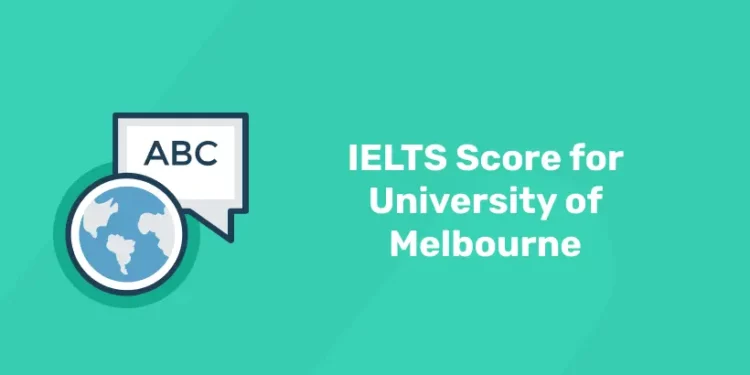Table of Contents
For the students aspiring to study at the University of Melbourne,shows a strong command of the English language is essential. The IELTS (International English Language Testing System) is a key component in the admissions process, as it helps assess your readiness for an academic environment where English is the primary language of instruction. In this blog, we’ll explore the IELTS score requirements for the various programs at the University of Melbourne, and provide you with the valuable tips on how to prepare effectively for the test.
Master the IELTS Exam with Online Coaching – Enroll Today!
Introduction
About university of Melbourne
One of the most prominent and well-regarded universities in Australia is the University of Melbourne, which is situated in the Melbourne. It was founded in 1853 and is well known for its outstanding academic programs, substantial research output, and the active campus community. The institution provides a wide range of graduate, undergraduate, and the professional programs in the business, health, science, engineering, and arts, among the other subjects. Its extensive international collaborations and the varied student body are its commitment to innovation and the global engagement. As one of the best universities in the world, the University of Melbourne draws students from all over the world who want to study at the highest level.
The active campus of the institution is located in the center of Melbourne, a city renowned for its rich cultural diversity, thriving arts scene, and the excellent standard of living. The University of Melbourne is committed to creating a welcoming and encouraging the learning environment that promotes the creativity, critical thinking, and volunteer work among its students. Because of its emphasis on research and the academic excellent, it is a top option for students who want to have a big effect on their disciplines.
Why IELTS is Important for Admission to University of Melbourne
1. Accurate Assessment of English Proficiency
The International English Language Testing System, or IELTS, is essential for University of Melbourne admissions since it provides a reliable evaluation of an applicant’s proficiency in the English language. The test assesses the students’ proficiency in all areas of English required for the academic success, specifically listening, reading, writing, and speaking. This thorough the assessment aids the university in determining if candidates can follow lectures, contribute to class debates, and then, successfully finish assignments written in English.
2. Meeting Academic Requirements
The principal language of instruction at the University of Melbourne is English. Thus, proving that you have a solid grasp of the English language is important for fulfilling the academic criteria. The IELTS score serves as a standard for determining the degree of language competency required to be successful in an academic setting where the language is spoken. The institution guarantees that students are adequately equipped to meet the language requirements of their programs by imposing the strict restrictions on their IELTS score, which in turn improves their overall academic achievement.
3. Maintaining High Academic Standards
One important instrument for upholding the university’s strict academic requirements is the IELTS score. It helps the University of Melbourne ensure that all the students meet a consistent level of English proficiency, which supports the institution’s commitment to the academic excellence. The university lessens the possibility that students’ inability to communicate with the classmates and participate in class may be hampered by language hurdles by imposing an IELTS score requirement.
4. Facilitating Smooth Integration
Fulfilling the IELTS standards enables overseas the students to more easily integrate into the University of Melbourne’s academic community. A high IELTS score suggests that a student is prepared to participate in the various learning environment of the institution and give their all in their studies. Students are able to participate in class discussions and work well with others when they are prepared for the successful integration.
Master the IELTS Exam with Online Coaching – Enroll Today!
Minimum IELTS Score Requirement for the University of Melbourne
1. General Minimum Score
For the most undergraduate and graduate programs at the University of Melbourne, a minimum overall band score of 6.5 in the IELTS Academic test is required. This score indicates that you have a solid grasp of the English language and are capable of understanding and engaging with the academic content.
2. Individual Section Scores
In addition to the overall score, the university typically requires a minimum score of 6.0 in each of the four individual components of the IELTS: Listening, Reading, Writing, and Speaking. This ensures that you have a balanced proficiency in all the areas essential for the academic success.
3. Program-Specific Requirements
Certain programs, especially at the graduate level or those with the competitive entry requirements, may have higher IELTS score thresholds. For example, some programs might require an overall band score of 7.0 with no individual component below 6.5. It is important to check the specific requirements for your chosen program to ensure you meet or exceed their criteria.
4. Validity of IELTS Scores
The University of Melbourne accepts the IELTS scores that are no older than two years from the date of the test. This validity period ensures that your language proficiency is current and relevant to your academic needs.
IELTS Score Validity and Application Process
By understanding the validity of your IELTS scores and following the correct application process, you can effectively shows your English proficiency and enhance your chances of admission to the University of Melbourne.
IELTS Score Validity
1. Validity Period
The IELTS (International English Language Testing System) scores are valid for two years from the date of the test. This means that the scores you submit to the University of Melbourne must be less than two years old at the time of your application. The two-year validity period ensures that your English proficiency is current and reflective of your ability to succeed in an academic setting.
2. Expired Scores
If your IELTS scores are older than two years, they are considered expired and will not be accepted by the University of Melbourne. In this case, you will need to retake the IELTS exam and submit your updated scores as part of your application process. This ensures that all applicants meet the university’s language proficiency requirements with recent and relevant scores.
Application Process for Submitting IELTS Scores
1. Register for the IELTS Exam
Begin by registering for the IELTS Academic test through an official test center or online. Schedule your exam well in advance to ensure you have sufficient time to receive your scores before the application deadline.
2. Take the IELTS Test
Complete the IELTS exam, which includes Listening, Reading, Writing, and Speaking sections. After taking the test, you will receive your scores in each of these areas, as well as an overall band score.
3. Submit Your Application
When applying to the University of Melbourne, fill out the university’s online application form and provide all required documents. Be sure to indicate that you are submitting IELTS scores as proof of your English language proficiency.
4. Send IELTS Scores
Request that your official IELTS Test Report Form (TRF) be sent directly to the University of Melbourne. Most IELTS test centers offer the option to send your scores electronically to institutions. Provide the university’s official name and address or select the University of Melbourne from the list of institutions if submitting electronically.
5. Verify Submission
Once the university receives your IELTS scores, they will be reviewed as part of your application. Ensure that your scores meet or exceed the minimum requirements for your chosen program. You may be contacted if additional information or documentation is needed.
6. Await Admission Decision
After submitting your IELTS scores and completing your application, the University of Melbourne will assess your application based on various criteria, including your language proficiency. Meeting the IELTS requirements is crucial but does not guarantee admission, as other factors such as academic records and program capacity are also considered.
Master the IELTS Exam with Online Coaching – Enroll Today!
IELTS Preparation Tips for university of Melbourne Applicants
1. Understand the Test Format
Become familiar with the IELTS Academic test’s format. There are four sections on the exam: Speaking, Writing, Reading, and Listening. Different facets of your English proficiency are tested in the each section. You can lessen your test-day nervousness and better manage your time if you know the format and kinds of questions you’ll face.
2. Set Clear Goals
Find out the minimum IELTS score needed for the University of Melbourne program you have selected. Generally, a program must have an overall band score of 6.5, with no band falling below 6.0; however, some programs may have greater score requirements. You may better focus your preparation efforts and track your progress by having a clear aim in place.
3. Practice Regularly
To get a good score on the IELTS, practice often. Take timed, full-length practice exams using the official IELTS study resources. This will enhance your time management abilities and help you get used to the format of the test. To increase your proficiency across the board, try to practice every component of the test on a regular basis.
4. Improve Your Listening and Speaking Skills
- Listening: Take in a range of audio content in English, including podcasts, news broadcasts, and scholarly lectures. Practice recognizing overarching themes, key concepts, and fine details.
- Speaking: Engage in regular conversation in English with native speakers or via language-exchange websites. Pay attention to your pronunciation, fluency, and clarity of thought. Talk about a variety of subjects to gain confidence.
5. Enhance Your Reading and Writing Abilities
- Reading: To enhance your comprehension of what you read, read scholarly articles, newspapers, and journals. Learn to scan for specific information and to skim for the major ideas. Learn about several question formats, including matching, short answer, and multiple-choice questions.
- Writing: Get comfortable responding to IELTS writing prompts with essays and reports. Make sure to use proper academic language, rationally express your thoughts, and clearly structure your articles. Be mindful of your terminology, grammar, and coherence.
6. Take Advantage of Preparation Resources
- IELTS Study Materials: Books like “Barron’s IELTS Superpack” and “The Official Cambridge Guide to IELTS” offer practice questions along with thorough explanations.
- Online Courses and Apps: A plethora of online resources include practice questions, interactive tools, and courses for IELTS preparation.
- IELTS Preparation Classes: Take into account signing up for a class or seeing a tutor who may offer tailored advice and feedback.
7. Review and Analyze Your Practice Tests
Examine your responses after completing practice exams to see where you may make improvements. Examine any errors you’ve made to determine where you went wrong and how to fix them. Make necessary adjustments to your study strategy based on your areas of weakness.
8. Develop Test-Taking Strategies
- For Listening: To help you remember important information, read the questions before listening to the audio and take notes while you listen.
- For Reading: Before responding to questions, practice skimming texts to gain an overview. Also, make sure you manage your time well to finish all the questions.
- For Writing: Before you write, take the time to plan your reports and essays. Be careful to address every aspect of the question and make use of a variety of sentence styles.
- For Speaking: Get ready for typical subjects and work on providing clear, concise answers to questions. To show off your linguistic proficiency, use a range of terminology and phrase constructions.
9. Stay Calm and Confident
On the day of the test, stay calm and confident. Get a good night’s sleep before the exam and arrive at the test center with plenty of time. Read all the instructions carefully, manage your time effectively, and approach the each section with a positive mindset.
Master the IELTS Exam with Online Coaching – Enroll Today!









